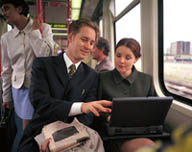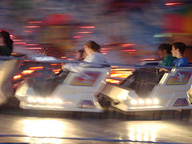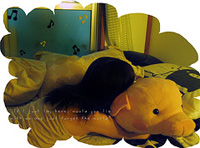PROBLEMS AND OPPORTUNITIES.- Culture and People. Sustainable transport.

Transport systems have significant impacts on the environment, accounting for between 20% and 25% of world energy consumption and carbon dioxide emissions. Greenhouse gas emissions from transport are increasing at a faster rate than any other energy using sector. Road transport is also a major contributor to local air pollution and smog.
The social costs of transport include road crashes, air pollution, physical inactivity, time taken away from the family while commuting and vulnerability to fuel price increases. Traffic congestion imposes economic costs by wasting people's time and by slowing the delivery of goods and services.
Traditional transport planning aims to improve mobility, especially for vehicles, and may fail to adequately consider wider impacts. Sustainable transport is about finding ways to move people, goods and information in ways that reduce its impact on the environment, the economy, and society.
Some options include:
- Using transport modes that use energy more efficiently, such as walking or cycling and public transport.
- Improving transport choice by increasing the quality of public transport, cycling and walking facilities, services and environments.
- Improving the efficiency of our car use, such as using more fuel efficient vehicles, driving more efficiently, avoiding cold starts, and car pooling.
- Using cleaner fuels and technologies.
- Using telecommunications to reduce or replace physical travel, such as tele-working or tele-shopping.
- Planning the layout of our cities to bring people and their needs closer together, and to make cities more vibrant and walkable.
- Developing policies that allow and promote these options.
Adapted from http://www.mfe.govt.nz/issues/transport/sustainable/
And http://en.wikipedia.org/wiki/Sustainable_transport
Decide if the following are true or false:
Transport systems account for approximately one quarter of carbon dioxide emissions.
Discuss in the forum:
- Can you think of other tips you can give your partners to reduce environmental pollution?
- Do you ever car pool? Why / Why not?
- Do you tele-work? Do you know anyone who does?

1.- Business idioms: Travel and transport.
Let's continue with our section of idioms. In this unit we are going to focus on those idioms related to travel and transport.

| Idiom | Meaning |
|---|---|
| Jump on the bandwagon. |
If a person or organization jumps on the bandwagon, they decide to do something when it is already successful or fashionable. When organic food became popular, certain stores were quick to jump on the bandwagon and promote it. |
| In the same boat. |
If two or more parties are in the same boat, they are in the same unpleasant or difficult situation. When the factory closed down, the workers all found themselves in the same boat. |
| Miss the boat. |
If you miss the boat, you fail to take advantage of an opportunity because you don't act quickly enough. I managed to get my order through before the end of the special offer - but I nearly missed the boat! |
| Put the cart before the horse. |
A person who puts the cart before the horse is doing things in the wrong order. Building a school before knowing the age of the population is putting the cart before the horse. |
| My way or the highway. |
If you say to someone "it's my way or the highway" you are telling that person that either they accept what you tell them to do or they leave the project. You don't have much choice when someone says : "It's my way or the highway. |
| Fall off the back of a lorry. | If you buy goods that have fallen off the back of a lorry, they are stolen goods. Judging by the price of that camera, it must have fallen off the back of a lorry! |
| Take someone for a ride. |
To take someone for a ride means to cheat or deceive them. I discovered he had charged me double the normal fee. He really took me for a ride! |
| Sail close to the wind. |
If you sail close to the wind, you do something dangerous or act just within the limits of what is legal or acceptable. He seems to invest his money well although he often sails close to the wind. |
| Sail through something. |
If you sail through something, for example a test or an exam, you succeed in doing it without difficulty. The English test was no problem for Tom. He sailed through it! |
| Live out of a suitcase. |
Someone who lives out of a suitcase travels a lot, moving from place to place, and is therefore restricted to the contents of their suitcase. Sarah's new job involves so much travelling that she lives out of a suitcase most of the time. |
Adapted from http://www.learn-english-today.com/idioms/idiom-categories/travel-transport.htm
Complete the following sentences with the missing words.
- She’s an excellent student. I’m sure she’ll through that test.
- Publishers jumped on the DVD even though they didn't know if they could sell DVDs.
- My flatmate is always complaining that she doesn't have enough money, but we're all in the same .
- You're eating a piece of cake for starters! You've put the before the .
- We thought they were sailing a bit to the in their business deals, but they claimed everything was legal.
- He hadn't written anything, when he told his publisher he'd finished a new novel. He definitely tried to take him for a .
2.- Songs about transport: Chasing cars.

There are many songs about transportation. How many can you remember? Which one is your favourite? Here are some examples:
- Right track wrong train, by Cyndi Lauper.
- Last train to London, by ELO.
- Train fare home blues, by Muddy Waters.
- Approaching train, by Brian Eno.
- Long and winding road / Drive my car, by The Beatles.
- Fly away, by Lenny Kravitz.
- Mystery train, by Elvis Presley.
- Paparazzi on mopeds, by The Cranberries.
- Watching the planes go by, by Elton John.
- White limo, by Foo Fighters.
Now, match the words in bold from the list above with the definitions:
| Definitions | Match | Expressions |
|---|---|---|
| The price you pay to travel somewhere by bus, train, plane, etc. | 1. Track. | |
| Curving, sinuous. | 2. Fare. | |
| A very large, expensive, and comfortable car, driven by someone who is paid to drive. | 3. Approaching. | |
| A small two-wheeled vehicle with an engine. | 4. Winding. | |
| Moving towards someone or something. | 5. Moped. | |
| The two metal lines along which trains travel. | 6. Limo. |
Watch the video of the song "Chasing cars" and read the lyrics. What do you think the title of the song refers to?
The phrase "Chasing Cars" came from the father of one of the members of the band, in reference to a girl. He said to his son "You're like a dog chasing a car. You'll never catch it and you just wouldn't know what to do with it if you did.”
Appendix.- Licenses of resources.
| Resource (1) | Resource information (1) | Resource (2) | Resource information (2) |
|---|---|---|---|
 |
By: Stockbyte. License: Uso educativo no comercial para plataformas públicas de Formación Profesional a distancia. From: CD-DVD Num. CD73. |
 |
By: Jason. License: CC by-nc-sa. From: http://www.flickr.com/photos/jc_sharp/3268982114/ |
 |
By: yu m. License: CC by 2.0. From: http://www.flickr.com/photos/yuumm/1321715282/ |